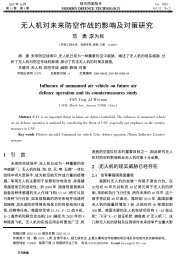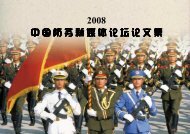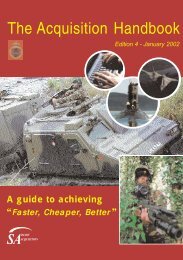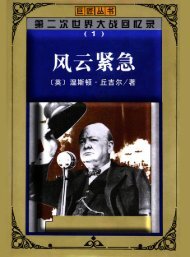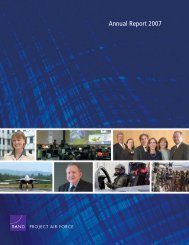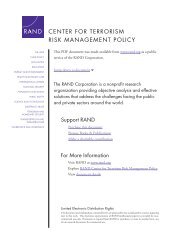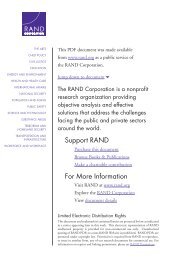How Terrorist Groups End - RAND Corporation
How Terrorist Groups End - RAND Corporation
How Terrorist Groups End - RAND Corporation
Create successful ePaper yourself
Turn your PDF publications into a flip-book with our unique Google optimized e-Paper software.
32 <strong>How</strong> <strong>Terrorist</strong> <strong>Groups</strong> <strong>End</strong>: Lessons for Countering al Qa’ida<br />
tance against the state. 71 In 70 percent of the cases since 1968 in which<br />
military force was effective, it was against groups that had more than<br />
100 members. For example, military force was successful in defeating<br />
the Revolutionary United Front (RUF) in Sierra Leone. Britain was<br />
especially helpful in deploying approximately 4,500 soldiers and an<br />
aircraft carrier to Sierra Leone in 2000, which were pivotal in routing<br />
RUF forces and stabilizing the country. 72 As one 19-year-old student<br />
in Sierra Leone noted, “We love the British soldiers—they are showing<br />
some military guarantee. They are well equipped. They are not afraid<br />
like the U.N., like the Kenyans and Zambians who just gave up their<br />
arms and were taken hostage. They are not here to take any rubbish.” 73<br />
In Uruguay, the military unleashed a bloody campaign of mass arrests<br />
and selected disappearances against the Tupamaros, dispersing those<br />
guerrillas who were not killed or arrested. By 1972, the Tupamaros<br />
had been severely weakened, and its principal leaders were imprisoned.<br />
Even during insurgencies, however, there are limits to how military<br />
force can be used. As David Galula argued, “[C]onventional operations<br />
by themselves have at best no more effect than a fly swatter. Some guerrillas<br />
are bound to be caught, but new recruits will replace them as fast<br />
as they are lost.” 74<br />
Victory<br />
Since 1968, 10 percent of the terrorist groups that ended did so because<br />
they had achieved their goals. As Nobel Laureate in Economics Thomas<br />
Schelling wrote, terrorist groups may accomplish “intermediate means<br />
toward political objectives . . . but with a few exceptions it is hard to see<br />
71 On definitions of insurgency and civil war, see, for example, Michael W. Doyle and<br />
Nicholas Sambanis, Making War and Building Peace: United Nations Peace Operations, Princeton,<br />
N.J.: Princeton University Press, 2006, p. 31; Stathis N. Kalyvas, The Logic of Violence<br />
in Civil War, Cambridge and New York: Cambridge University Press, 2006, p. 5; and Fearon<br />
and Laitin (2003).<br />
72 See, for example, Richard Connaughton, “Operation ‘Barass,’” Small Wars and Insurgencies,<br />
Vol. 12, No. 2, Summer 2001, pp. 110–119; and Doyle and Sambanis (2006, p. 318).<br />
73 Norimitsu Onishi, “British Plans to Leave Sierra Leone Prompt Worry,” New York Times,<br />
June 7, 2000, p. A14.<br />
74 Galula (2005, p. 72).




